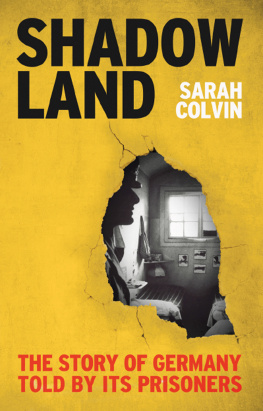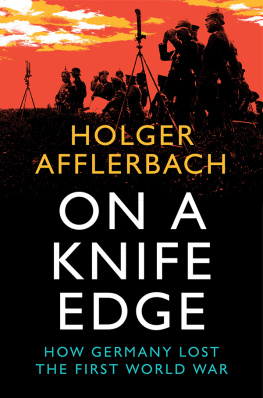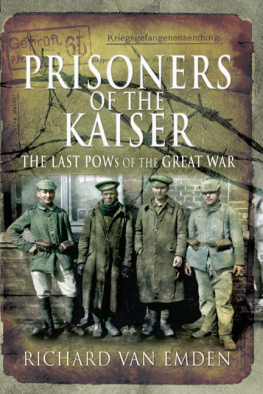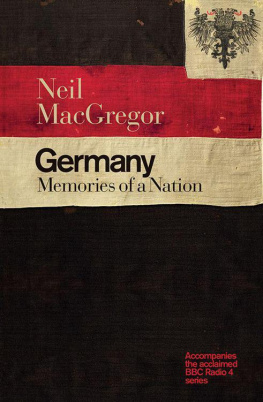SHADOWLAND

I am forgotten, shadow only, gone.
A.P., The Prisoner (trans. Naomi Reiss)
It is said that no one truly knows a nation
until one has been inside its jails.
Nelson Mandela
SHADOWLAND
THE STORY OF GERMANY
TOLD BY ITS PRISONERS
SARAH COLVIN
REAKTION BOOKS
For Cary Parker and Christopher Parker-Colvin:
partners in metaphorical crime
Published by
Reaktion Books Ltd
Unit 32, Waterside
4448 Wharf Road
London N1 7UX, UK
www.reaktionbooks.co.uk
First published 2022
Copyright Sarah Colvin 2022
All rights reserved
No part of this publication may be reproduced, stored in a retrieval system or transmitted, in any form or by any means, electronic, mechanical, photocopying, recording or otherwise, without the prior permission of the publishers
Page references in the Photo Acknowledgements and
Index match the printed edition of this book.
Printed and bound in Great Britain by TJ Books Ltd, Padstow, Cornwall
A catalogue record for this book is available from the British Library
eISBN 9781789146288
Contents
Preface
No one knows where I am right now, I realize. People at work, my employer, my customers, my wife, my parents, my friends... a whole list of names and faces. When will they start to wonder where I am? I feel terrible and the lump in my throat just gets bigger and bigger. Then its my turn.
Put your personal things
clothes too
on the table.
Undress!
Now?
Here?
Yes!
Come on, I bet youre not usually this shy.
I peel off my jeans, coat, shirt, socks. Hesitate. Everything! I pull down my boxer shorts and put them with the other things. Naked in a room full of monitors and bored prison officers. The number of my cell is 172, my prison number is 357/9. The officer just unlocks the cell and checks with me that nothing is broken and everything is there. Then he locks the door behind me. My first moment alone in a prison cell.
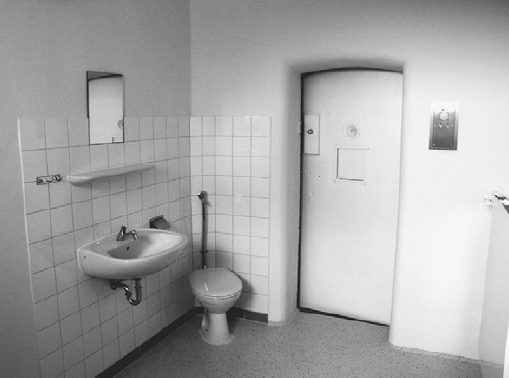
Prison cell, Hamburg, 2006.
Foreword
Prisons reflect society and society needs to take a long, sober look in the mirror.
UK prisoner, writing to Inside Time, 2017
P risons are in crisis. The worlds prison population is rising faster than its general population; prison has become an industry and in overcrowded, understaffed conditions violence levels are rising. The United States holds more than 2 million of the worlds 11 million people in prison, and China holds 1.65 million, or 2.3 million if you also count people held in detention centres.
In the context of the often violent and disturbing stories that follow it is worth remembering that Germany currently locks up far fewer people, in generally better conditions and with better human rights, than (for example) the UK or USA. German nationals in prison in the Federal Republic have the right to vote, for example, unlike people in prison in the United States or UK. The incarceration rate in England and Wales, at 130 per 100,000 in June 2021, approaches double Germanys rate of 69 per 100,000; the USA tops the charts with Recently a prisoner union was founded by people in prison in Germany, focused on issues such as fair pay and pensions. The National Society for the Prevention of Torture (Nationale Stelle zur Verhtung von Folter) visits and reports each year on a sample of institutions across Germany, most recently on conditions during the covid-19 pandemic.
On the one hand there is no one better qualified than a prisoner to report on prison; on the other hand there is no one more partial.
Hans Kaltenbach, 1957
This is not a systematic history of German prisons. It is the story of Germany told, as far as possible, in the words of people in prison. I always say that prison is the mirror of our society, wrote Ewald, serving time in North RhineWestphalia: People society doesnt want to see get locked away. But nobody wants to know how many of those people were made that way by society. Prison is just a magnifying mirror, agreed the novelist and prisoner Peter Feraru. By that logic people in prison are neither better nor worse than society like the rest of us, they are society.
More normally, people outside encounter the stories of famous or notorious prisoners. This book tells the stories of the little people in prison. Most are or were serving time for crimes committed against a background of unemployment and poverty or the desire to participate in consumer culture. Some of the men were punished for being homosexual, particularly in post-war West Germany, where consensual sex between adult men became legal only in 1969 (it was formally legalized in East Germany in 1968, but the paragraph forbidding gay sex was not enforced after 1957).
Inevitably, some peoples stories are missing. I have relied heavily on peoples capacity to write their accounts down; but around 20 per cent of the people held in German prisons are illiterate,
I have focused on the topics and themes that occur most regularly in stories from German prisons across the decades. People in prison have something to say that society outside needs to hear ideally without demonizing, and without romanticizing. One writer in prison noticed the impulse his readers had to see him as an exotic being, or even to admire his criminal status.
But who goes to prison, and why?
I used to think I was poor,
Then I was told
I wasnt poor,
but needy.
Then I was told it was
self-destructive
to think of myself as needy
I was deprived.
Then I was told that
deprivation had a bad image
I was underprivileged.
Then I was told that underprivileged was overused
I was disadvantaged.
Then they said, disadvantaged
meant avoiding responsibility
I was socially weak.
Then I found out that socially weak was mega-out
I was precarious.
In Wanne-Eickel I heard I lacked
opportunities to participate.
I must say, I still
dont have a cent in my pocket,
but my vocabulary has been enriched
enormously!
Anon., 2017
People are supposed to be incarcerated not because of who or what they are but because of things they do. It is not quite that straightforward, of course. The criminologist Dario Melossi defines criminality as behavior seen as threatening to the dominant group interests. That complicates the idea that it is only about what we do. It is also about whether it is in the interests of government and society to prosecute what we do as criminal (hence the otherwise inexplicable fact that very powerful people sometimes seem to get away with murder, while our prisons are full of people from socially disempowered backgrounds).
Being a woman is, statistically speaking, an effective way to avoid prison women make up only between 2 and 9 per cent of the prison population globally.
Education matters: in 2013 nearly 60 per cent of men in custody in Germany had either no school-leaving qualification or the most basic one (

